How does the Labour party recover? Harriet Harman set out how it will try to come back from its latest election defeat in a speech this morning which told the party to listen to the customer because the customer is always right. Her basic pitch was that just like a product or a shop or a magazine, it’s more important to work out what people want to buy, rather than what you want to sell or write because your own tastes might not be particularly representative of the market that’s out there.
To that end, she told the audience that ‘as we conduct this debate, as we elect our leader and deputy leader, we must have the public in the forefront of our minds. We must let the public in.’
She said her own fight to become deputy leader had been in a ‘cosy contest’ in which the party ‘asked ourselves – who do we like”. This was, she said, ‘the wrong question’, with the right question being ‘who does the country like?’ This all sounds rather obvious, but the party does seem to have suffered from assuming it knows what the country liked, without necessarily checking, or at least listening to the results of any research it had carried out.
Harman wants the party to let in ‘the people who most of the time are busy getting on with their lives, not thinking about politics’, and to do so by televising its hustings and holding those events in parts of the country that are not Labour strongholds. Of course, even then the sort of members of the public most likely to turn up or tune in to these events are still not really ‘the people who most of the time are busy getting on with their lives’, but people who have made some room in their lives for politics and who want to spend a wet Tuesday evening listening to a panel of leadership hopefuls who they are presumably sufficiently engaged to have heard of talking about their credentials.
But it’s a start, and it shows that Harman and colleagues are keen for the leadership debate to steer away from blaming other problems, like the right-wing press, or other things that Labour will ultimately have to live with and overcome, not complain about and hope they go away.
Part of bouncing back is also being honest about what’s wrong. Pat McFadden’s Thunderer in today’s Times makes this point: that tribal loyalty can be as damaging to a party as open fighting if it means that no-one feels able to warn that things are going in the wrong direction. He writes:
‘But there is a third and more insidious reason behind these calls for unity, and that is an attempt to close down discussion and paint anyone who shows honesty about the scale of defeat and the response needed as “factional” or “divisive”. In other words, calls for unity can be a strategy to shut out opponents.
‘Labour had enormous unity in the last parliament but it didn’t lead to a winning strategy. Unity is important but without thinking things through and reaching a conclusion about where you should go it is little more than censorship. For Labour at this moment the imperative is not unity but honesty. We have to ask ourselves some tough questions. We should debate, decide and then unite.’
The enthusiasm many Labour MPs have shown since the election to critique the way their party pitched itself to the electorate shows that the party was not in agreement about its policies or leadership, but merely silent. The two things are not the same. When there were grumblings about Ed Miliband’s leadership in the autumn, journalists were accused of making a bigger thing of a few voices of open dissent, but one of the problems was that we were sitting across coffee and lunch tables from miserable, anxious Labourites very happy to complain ad nauseam off the record, but who fled at the sight of a shorthand pencil or a dictaphone. When someone did stick their head above the parapet, they were speaking for many more than just themselves, and their words were written up accordingly.
The party internally was what one disgruntled shadow minister described to me as ‘Stalinist’, controlling MPs to the extent that they didn’t feel they had anyone in the hierarchy to voice concerns to. They could complain to hacks in private, but not go on the record, and neither could they complain to one of Miliband’s team. Whoever is the next leader needs to find a way of listening to his or her party so that they aren’t reduced to those quite complaints over coffee (though journalists are always happy to have those), but feel as though they really are involved.
The trade unions, of course, could complain as much as they wanted, though perhaps they need to have a little think about whether they really are speaking for their members as they claim they are, or whether their branches are still quite out of touch with the people who joined a union for protection at work and other membership benefits, rather than because of a burning desire to advance a socialist agenda in the Labour party.
This will mean the party being a little less sure of what it thinks the public thinks, and maybe even a leader who is a little less sure that they are always right, too, when thoughtful colleagues are telling them that they are wrong. But it’s clear that just a change of leader won’t change the party: the party needs to be ready to change too.







Comments